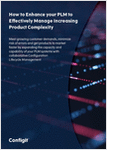 | More complex products with inherent quality risks The result is more complex products with inherent quality risks, requiring more complex testing, which in turn challenges product delivery schedules. Managing this growth in product complexity is now the major challenge that manufacturers face on their digital transformation journey. Scaling PLM to accommodate product configuration lifecycle management is certainly an option, but this assumes that product configuration complexity is solely an engineering concern. In fact, product configuration is a cross-functional concern as all departments from engineering to manufacturing, marketing, sales and service, require reliable and up-to-date product configuration information in order to execute their tasks efficiently. Enable PLM systems to scale to meet the growing complexity of products Configuration Lifecycle Management (CLM) enables PLM systems to scale to meet the growing complexity of products without impacting existing system installations and processes. CLM enhances existing PLM systems by providing an accurate and up-to-date status of valid product configuration options across multiple product variants and versions. Read Configit’s white paper for a closer look at how to meet growing customer demands, minimize risk of errors and get products to market faster by expanding the capacity and capability of your PLM systems with collaborative Configuration Lifecycle Management. Request Free! |
